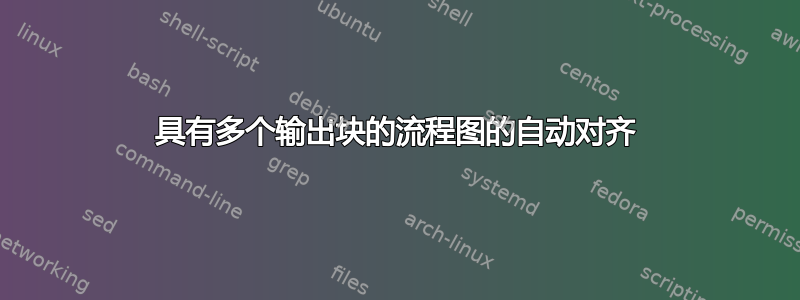
如果块中的文本“吹”了它并且它的尺寸开始干扰其他块,如何进行自动对齐(并具有多个输出块,例如 a、b、y)。
\documentclass[tikz,a4paper,border=1mm]{standalone}
\usepackage{pgfplots}
\usepackage{amsmath}
\usetikzlibrary{positioning,arrows}
\begin{document}
\tikzset{%
block/.style={draw, fill=white, rectangle,
minimum height=2em, minimum width=3em},
input/.style={inner sep=0pt},
output/.style={inner sep=0pt},
sum/.style = {draw, fill=white, circle, minimum size=2mm, node distance=1.5cm, inner sep=0pt},
pinstyle/.style = {pin edge={to-,thin,black}}
}
\begin{tikzpicture}[auto, node distance=1cm, >=latex']
\node[input] (input) {};
\node[input, above = of input] (input1) {};
\node [sum, right = of input] (sum) {};
\node [block, right = of sum] (system) {$\begin{cases} \dot{\vec{x}}_i=f_i(\vec{x}_i,t)+g_i(\vec{x}_i,t)u(t) \\ y=h_i(\vec{x}_i,t)\end{cases}$};
\node [output, right = of system] (output) {};
\node [output, above = of output] (output1) {};
\node [block, below = of system] (controller) {$K(s)$};
\draw [draw,->] (input) node[above right] {$0$} -- (sum);
\draw [->] (sum) -- node {$e_{i}$} (system);
\draw [->] (system) -- (output) node [name=q, above left] {$y$};
\draw [->] ([xshift=-5mm]q.south) |- node {$x$} (controller);
\draw [->] (controller) -| node[pos=0.99, right] {$-$}
node [pos=.25, above] {$s$} (sum);
\end{tikzpicture}
\end{document}
答案1
根据我的第二个例子回答关于你之前的问题:
\documentclass[preview, border=3.141592mm]{standalone}
\usepackage{tikz}
\usetikzlibrary{arrows.meta,
chains,
positioning,
quotes}
\tikzset{cntrl/.style = {
> = Stealth,
node distance = 4mm and 8mm,
box/.style = {draw, minimum size=7mm},
C/.style = {circle, draw, minimum size=4mm},
dot/.style = {circle, fill, inner sep=2pt, node contents={}},
every edge/.append style = {draw, ->},
start chain
} }
\usepackage{amsmath}
\begin{document}
\begin{tikzpicture}[cntrl]
\begin{scope}[nodes={on chain=going right}]
\coordinate (in) {};
\node (sum) [C] {};
\node (system) [box] {$\begin{cases}
\dot{\vec{x}}_i = f_i(\vec{x}_i,t)+g_i(\vec{x}_i,t)u(t) \\
y = h_i(\vec{x}_i,t)
\end{cases}$};
\coordinate (aux);
\coordinate (b);
\end{scope}
\node(filter) [box, below=of system] {$K(s)$};
%
\coordinate[above right=of aux] (a);
\coordinate[below right=of aux] (out);
\node (dot) [dot,at={(aux |- out)}];
\draw (in) edge["$s_{i-1}$"] (sum)
(sum) edge["$e_{i}$"] (system);
\draw[->] (system.east |- a) -- (a) node[right] {$a$};
\draw[->] (system.east |- b) -- (b) node[right] {$b$} ;
\draw[->] (system.east |- out) -- (out) node[right] {$q_{i}$};
%
\draw[->] (dot) |- (filter.east) node[above right] {$x$};
\draw[->] (filter) -| (sum) node[pos=0.25,above] {$s$}
node[below right] {$-$};
\end{tikzpicture}
\end{document}




